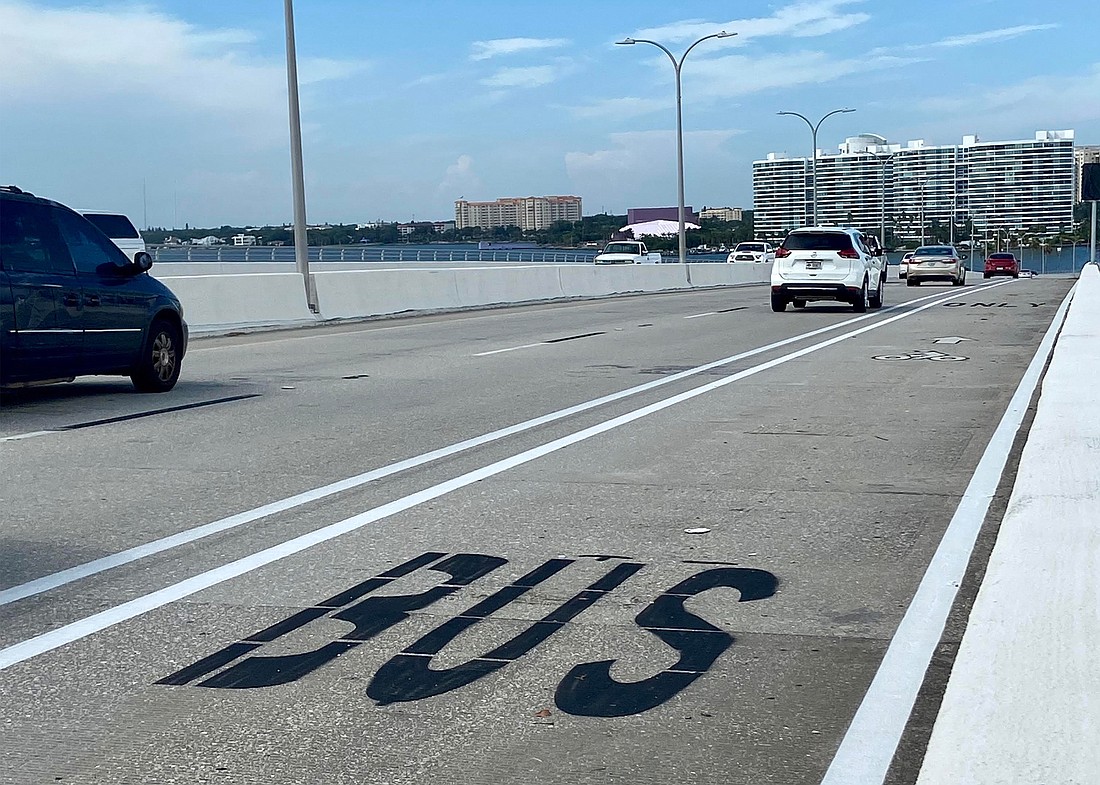- April 1, 2025
-
-
Loading

Loading

Pilots of two- and four-wheel vehicles crossing the Ringling Bridge in recent days have likely noticed changes in what was formerly a bicycle-only lane on the span between downtown Sarasota and Lido Key.
The Florida Department of Transportation, which funded the project, has been re-striping and re-marking the space to create a 10-foot-wide shared bus/bike “shoulder,” with plans to ultimately create dedicated bus and bike lanes by summer 2024. In 2018, the city of Sarasota initiated the concept in part to better facilitate a future trolley service over the often-congested bridge.
The bus/bike shoulder marking project is expected to be completed by August.
Launched in February, the open-air Bay Runner trolley circulates from downtown to South Lido Beach through St. Armands Circle. The trolley service crosses the Ringling Bridge in each direction every 20 to 30 minutes.
No width has been added to the space previously reserved only for bikes, which at 10 feet means it’s just wide enough to accommodate the open-air Bay Runner.
The Bay Runner will be allowed to use the shoulder at the driver’s discretion when traffic is 15 mph or slower. Drivers will be trained on strategies to enter and exit the lane and how to safely coexist with bicycles and electric scooters.
Two-wheeled vehicles, according to Sarasota City Engineer Nik Patel, will have priority in the shared shoulder. When on the shoulder, the trolley must maintain a 50-foot clearance behind bikes and scooters and cannot exceed 25 mph. Once the trolley is in the shoulder, it just remain there until the lane ends pending extraordinary circumstances.
“Ultimately, the drivers have to make sure that there is clearance between the bike and the scooters,” Patel said. “Drivers are trained how to get the bus on the shoulder and when to get on it. When traffic on the bridge is 15 mph or less, the driver has the option to get onto the shoulder. They first have to look for bicycles or scooters, and then if there's clearance, they take the bus on the shoulder.”
The shared shoulder is temporary. The ultimate plan is to have a dedicated bike and scooter lane, a dedicated bus lane and two general travel lanes, all without changing the physical structure of the bridge. The protected 10-foot pedestrian sidewalk on both sides of the bridge lane will remain.
There is enough width, Patel said, to accommodate the multiple uses.
“You’re going to have a 5-foot bike lane; an 11-foot transit lane, which is the dedicated bus lane; and then you'll have two 10-foot travel lanes,” Patel said. Narrowing the general travel lanes from the current 12 feet, he added, will effectively reduce the speeds while allowing room for the bus and bike lanes.
Coon Key Bridge just east of St. Armands Circle, which was third on the city’s list of transportation projects in 2021, fell to sixth this year. City officials acknowledged it was the Florida Department of Transportation’s responsibility to widen the span to allow for better pedestrian and cycling access.
“The city's leadership has had a long vision to increase micro-mobility within Sarasota,” said Mayor Erik Arroyo. “While in the past, projects would get kicked down the road after leaders failed to agree on a direction, the current City Commission took decisive action, which has paid off tremendously for the residents and visitors. … These options reduce our reliance on gas, are better for the environment and create a sense of adventure that is testament to our area being one of the top destinations in the country.”